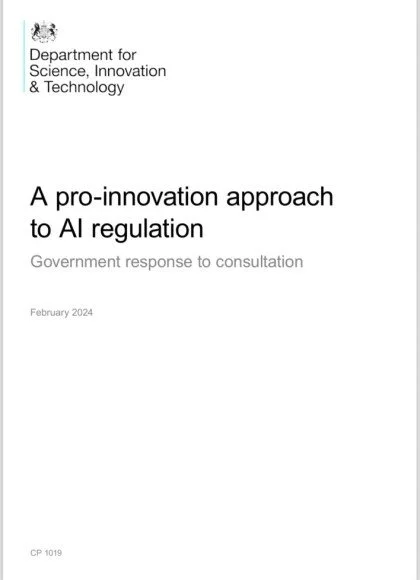AI regulation in the UK: in out in out shake it all about
“Great news for AI developers, terrible news for UK creators, business and the public as government Ministers confirm no new legislation or regulation of artificial intelligence (AI) in the UK for the foreseeable future. When just last week the House of Lords cautioned against the risk of regulatory capture, you’d be forgiven for wondering whether the government is seeking to curry favour with US Big Tech hoping for plum jobs in anticipation of an election loss? ”
Today the government confirms in its response to its White Paper on AI Regulation that there will be no new legislation to regulate AI - rejecting the Artificial Intelligence (Regulation) Bill tabled by Lord Holmes - and with regulators not yet match fit, the reality is that there will be no effective regulation of AI in the U.K. for some time. The government focus is that “Regulation must work for innovators”. But will this lax regime be enough to tempt AI developers to the UK and give the economic boost the government is presumably seeking to achieve? While US Big Tech seems unlikely to make a trans-atlantic move, perhaps European AI developers - faced with the EU AI Act - will be tempted.
In the government’s White Paper on AI regulation ‘A pro-innovation approach to AI regulation’ published in March 2023, the government stated “Initially, we do not intend to introduce new legislation” to regulate AI, intending instead to “leverage the expertise of our world class regulators” with the aim of maintaining agility to “establish the UK as an AI superpower”.
Just last week, however, the House of Lords’ Communications & Digital Committee published its report on ‘Large Language Models & Generative AI’, which called on the government to take a range of actions “at pace”, including requiring improved assessments and guardrails and implementing mandatory safety tests for high risk high impact AI models.
In the government’s response to its White Paper consultation, published today (06 February 2024), the government advocates for “a set of targeted, binding requirements on developers of highly capable general-purpose AI models in the future to ensure that powerful, sophisticated AI develops in a way which is safe”. While maintaining the position that its approach is correct, the government recognises that “the challenges posed by AI technologies will ultimately require legislative action in every country once understanding of risk has matured” and states that “We think a non-statutory approach currently offers critical adaptability… but we will keep this under review”. This is despite the recognition that “if the exponential growth of AI capabilities continues, and if - as we think could be the case - voluntary measures are deemed incommensurate to the risk, countries will want some binding measures to keep the public safe”.
So what is the government going to do?
Regulators (including Ofcom, the ICO, the CMA, the EHRC, Ofsted and the Office for Product Safety & Standards) will be required to outline the lie strategic approach to the regulation of AI within their competence by 30 April 2024.
New guidance has been published for the benefit of regulators on the 5 principles identified in the White Paper: safety, security & robustness; appropriate transparency and explainability; fairness; accountability and governance; and, contestability and redress
Conduct a gap analysis of regulators’ powers to regulate AI
Develop a monitoring and evaluation plan to assess the effectiveness of its regime, including a “targeted consultation” in Spring 2024
Lead AI Ministers appointed across all departments
The Centre for Data Ethics and Innovation (CDEI) will be re-branded to the Responsible Technology Adoption Unit (can we all agree to pronounce this “R2”?)
Publish updated guidance on the use of AI in HR & recruitment in Spring 2024
Engage with AI and rights holders to develop an approach to help them “grow together in partnership”
Explore mechanisms to achieve greater transparency around AI training data inputs
Reduce restrictions on automated decision-making, as already announced in the Data Protection & Digital Information Bill
Publish a call for evidence shortly on AI-related risks to trust in information
Consult on making compliance with the forthcoming AI Management Essentials Scheme a mandatory requirement for public sector procurement
Publish a call for views in Spring 2034 on securing AI models, and a related code of practice on the cyber security of AI
Encourage AI companies to develop their AI safety and responsible capability scaling policies
Update on the AI Safety Institute’s approach to evaluations
Establish dynamic thresholds to respond to advances in AI development based on compute and capability benchmarking with in-scope systems expected to comply with the 5 AI regulatory principles
For now, therefore, organisations developing or deploying AI who wish to comply with existing regulatory obligations or to ensure that they are at the forefront of using AI safely, responsibly and ethically, should conduct an AI risk assessment, establish an AI governance programme and appoint an AI Responsible Officer. If Handley Gill can support you with these, please contact us.
Access Handley Gill Limited’s proprietary AI CAN (Artificial Intelligence Capability & Needs) Tool, to understand and monitor your organisation’s level of maturity on its AI journey.
Download our Helping Hand checklist on using AI responsibly, safely and ethically.
Check out our dedicated AI Resources page.
Follow our dedicated AI Regulation Twitter / X account.

